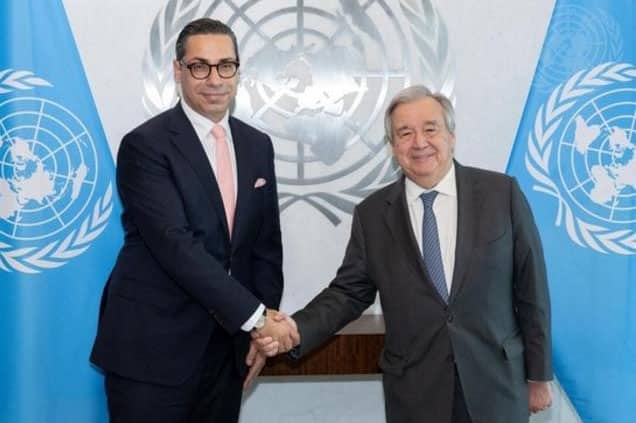Foreign minister Constantinos Kombos described his meeting with UN Secretary-General Antonio Guterres on Tuesday night as “particularly constructive,” saying that he stressed “our strong will to return to the negotiations from the point they stopped at Crans Montana and with the objective of a substantive discussion which would lead to the settlement of the Cyprus problem and the reunification of our country.”
At the meeting, Kombos said he analysed the Cyprus government’s initiative that contained the EU dimension as a catalyst for the progress of the procedure. He also said that Guterres viewed the warming of relations between the EU and Turkey positively as it could give the Turkish side the motive to return to the negotiating table. But it was quite clear from what the minister said that the UNSG does not consider the time has come to appoint a special envoy.
They discussed the issue of appointing an envoy in the next period, said Kombos, and that “from our point of view, the message was clear, we are ready for the next step.” He admitted that “we are not yet at the stage of discussing names,” indicating that Guterres considered the time was not right for the appointment of an envoy yet. Although President Christodoulides has been urging the UNSG to appoint an envoy, Guterres has refused to do so, because, understandably, he considered such a move pointless in current conditions.
This did not, however, stop the UN Security Council urging him to appoint an envoy to head efforts for a return to the talks. In a statement issued on Wednesday the Security Council reiterated its commitment to a bizonal, bicommunal federation with political equality. This was welcomed by the Cyprus government, although Ankara was quick to criticize the Security Council for insisting “on a settlement model from which the Turkish Cypriot side has openly withdrawn its support.” The settlement model, Ankara said “has been tried and failed many times.”
Why would the UNSG appoint an envoy when the two sides do not support the same settlement model? Such an envoy would fail as did Jan Holl Lute, who was given the job of bringing the two sides back to the negotiating table. There must be a commitment to the same settlement model for Guterres to appoint an envoy who will work for the resumption of the talks. This, quite plainly, does not exist at present, nor has there been any attempt by either side to find a way to break this deadlock.
Without a change in conditions, Guterres is perfectly justified not to appoint an envoy, even though our government likes to pretend that it does not see this and keeps repeating the demand for an envoy.







Click here to change your cookie preferences